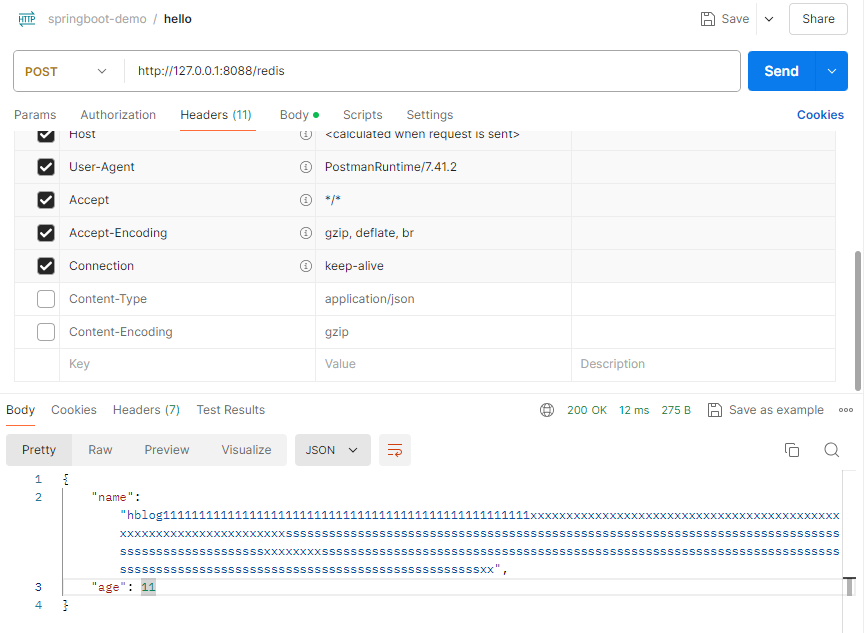1.为什么需要压缩json?
由于业务需要,存入redis中的缓存数据过大,占用了10+G的内存,内存作为重要资源,需要优化一下大对象缓存,采用gzip压缩存储,可以将 redis 的 kv 对大小缩小大约 7-8 倍,加快存储、读取速度
2.环境搭建
详建redis模块的docker目录
version: '3'
services:
redis:
image: registry.cn-hangzhou.aliyuncs.com/zhengqing/redis:6.0.8
container_name: redis
restart: unless-stopped
command: redis-server /etc/redis/redis.conf --requirepass 123456 --appendonly no
# command: redis-server --requirepass 123456 --appendonly yes
environment:
TZ: Asia/Shanghai
LANG: en_US.UTF-8
volumes:
- "./redis/data:/data"
- "./redis/config/redis.conf:/etc/redis/redis.conf"
ports:
- "6379:6379"3.代码工程
实验目标
实验存入redis的json数据压缩和解压缩
pom.xml
<?xml version="1.0" encoding="UTF-8"?>
<project xmlns="http://maven.apache.org/POM/4.0.0"
xmlns:xsi="http://www.w3.org/2001/XMLSchema-instance"
xsi:schemaLocation="http://maven.apache.org/POM/4.0.0 http://maven.apache.org/xsd/maven-4.0.0.xsd">
<parent>
<artifactId>springboot-demo</artifactId>
<groupId>com.et</groupId>
<version>1.0-SNAPSHOT</version>
</parent>
<modelVersion>4.0.0</modelVersion>
<artifactId>gzip</artifactId>
<properties>
<maven.compiler.source>8</maven.compiler.source>
<maven.compiler.target>8</maven.compiler.target>
</properties>
<dependencies>
<dependency>
<groupId>org.springframework.boot</groupId>
<artifactId>spring-boot-starter-web</artifactId>
</dependency>
<dependency>
<groupId>org.springframework.boot</groupId>
<artifactId>spring-boot-autoconfigure</artifactId>
</dependency>
<dependency>
<groupId>org.springframework.boot</groupId>
<artifactId>spring-boot-starter-test</artifactId>
<scope>test</scope>
</dependency>
<dependency>
<groupId>org.projectlombok</groupId>
<artifactId>lombok</artifactId>
</dependency>
<dependency>
<groupId>org.springframework.boot</groupId>
<artifactId>spring-boot-starter-data-redis</artifactId>
</dependency>
<dependency>
<groupId>org.apache.commons</groupId>
<artifactId>commons-pool2</artifactId>
<version>2.9.0</version>
</dependency>
</dependencies>
</project>controller
package com.et.gzip.controller;
import com.et.gzip.model.User;
import lombok.extern.slf4j.Slf4j;
import org.springframework.beans.factory.annotation.Autowired;
import org.springframework.data.redis.core.RedisTemplate;
import org.springframework.web.bind.annotation.PostMapping;
import org.springframework.web.bind.annotation.RequestBody;
import org.springframework.web.bind.annotation.RequestMapping;
import org.springframework.web.bind.annotation.RestController;
import java.util.HashMap;
import java.util.Map;
@RestController
@Slf4j
public class HelloWorldController {
@Autowired
private RedisTemplate redisTemplateWithJackson;
@PostMapping("/hello")
public User showHelloWorld(@RequestBody User user){
log.info("user:"+ user);
return user;
}
@PostMapping("/redis")
public User redis(@RequestBody User user){
log.info("user:"+ user);
redisTemplateWithJackson.opsForValue().set("user",user);
User redisUser = (User) redisTemplateWithJackson.opsForValue().get("user");
return redisUser;
}
}redis压缩和解压缩配置
压缩类
package com.et.gzip.config;
import com.et.gzip.model.User;
import com.fasterxml.jackson.databind.ObjectMapper;
import com.fasterxml.jackson.databind.annotation.JsonSerialize;
import lombok.extern.slf4j.Slf4j;
import org.apache.tomcat.util.http.fileupload.IOUtils;
import org.springframework.data.redis.serializer.JdkSerializationRedisSerializer;
import org.springframework.data.redis.serializer.SerializationException;
import sun.misc.BASE64Encoder;
import java.io.ByteArrayInputStream;
import java.io.ByteArrayOutputStream;
import java.text.SimpleDateFormat;
import java.util.zip.GZIPInputStream;
import java.util.zip.GZIPOutputStream;
@Slf4j
public class CompressRedis extends JdkSerializationRedisSerializer {
public static final int BUFFER_SIZE = 4096;
private JacksonRedisSerializer<User> jacksonRedisSerializer;
public CompressRedis() {
this.jacksonRedisSerializer = getValueSerializer();
}
@Override
public byte[] serialize(Object graph) throws SerializationException {
if (graph == null) {
return new byte[0];
}
ByteArrayOutputStream bos = null;
GZIPOutputStream gzip = null;
try {
// serialize
byte[] bytes = jacksonRedisSerializer.serialize(graph);
log.info("bytes size{}",bytes.length);
bos = new ByteArrayOutputStream();
gzip = new GZIPOutputStream(bos);
// compress
gzip.write(bytes);
gzip.finish();
byte[] result = bos.toByteArray();
log.info("result size{}",result.length);
//return result;
return new BASE64Encoder().encode(result).getBytes();
} catch (Exception e) {
throw new SerializationException("Gzip Serialization Error", e);
} finally {
IOUtils.closeQuietly(bos);
IOUtils.closeQuietly(gzip);
}
}
@Override
public Object deserialize(byte[] bytes) throws SerializationException {
if (bytes == null || bytes.length == 0) {
return null;
}
ByteArrayOutputStream bos = null;
ByteArrayInputStream bis = null;
GZIPInputStream gzip = null;
try {
bos = new ByteArrayOutputStream();
byte[] compressed = new sun.misc.BASE64Decoder().decodeBuffer( new String(bytes));;
bis = new ByteArrayInputStream(compressed);
gzip = new GZIPInputStream(bis);
byte[] buff = new byte[BUFFER_SIZE];
int n;
// uncompress
while ((n = gzip.read(buff, 0, BUFFER_SIZE)) > 0) {
bos.write(buff, 0, n);
}
//deserialize
Object result = jacksonRedisSerializer.deserialize(bos.toByteArray());
return result;
} catch (Exception e) {
throw new SerializationException("Gzip deserizelie error", e);
} finally {
IOUtils.closeQuietly(bos);
IOUtils.closeQuietly(bis);
IOUtils.closeQuietly(gzip);
}
}
private static JacksonRedisSerializer<User> getValueSerializer() {
JacksonRedisSerializer<User> jackson2JsonRedisSerializer = new JacksonRedisSerializer<>(User.class);
ObjectMapper mapper=new ObjectMapper();
jackson2JsonRedisSerializer.setObjectMapper(mapper);
return jackson2JsonRedisSerializer;
}
}java序列化
package com.et.gzip.config;
import com.fasterxml.jackson.databind.JavaType;
import com.fasterxml.jackson.databind.ObjectMapper;
import com.fasterxml.jackson.databind.type.TypeFactory;
import lombok.extern.slf4j.Slf4j;
import org.springframework.data.redis.serializer.RedisSerializer;
import org.springframework.data.redis.serializer.SerializationException;
import org.springframework.lang.Nullable;
import org.springframework.util.Assert;
import java.nio.charset.Charset;
import java.nio.charset.StandardCharsets;
@Slf4j
public class JacksonRedisSerializer<T> implements RedisSerializer<T> {
public static final Charset DEFAULT_CHARSET;
private final JavaType javaType;
private ObjectMapper objectMapper = new ObjectMapper();
public JacksonRedisSerializer(Class<T> type) {
this.javaType = this.getJavaType(type);
}
public JacksonRedisSerializer(JavaType javaType) {
this.javaType = javaType;
}
public T deserialize(@Nullable byte[] bytes) throws SerializationException {
if (bytes == null || bytes.length == 0) {
return null;
} else {
try {
return this.objectMapper.readValue(bytes, 0, bytes.length, this.javaType);
} catch (Exception var3) {
throw new SerializationException("Could not read JSON: " + var3.getMessage(), var3);
}
}
}
public byte[] serialize(@Nullable Object t) throws SerializationException {
if (t == null) {
return new byte[0];
} else {
try {
return this.objectMapper.writeValueAsBytes(t);
} catch (Exception var3) {
throw new SerializationException("Could not write JSON: " + var3.getMessage(), var3);
}
}
}
public void setObjectMapper(ObjectMapper objectMapper) {
Assert.notNull(objectMapper, "'objectMapper' must not be null");
this.objectMapper = objectMapper;
}
protected JavaType getJavaType(Class<?> clazz) {
return TypeFactory.defaultInstance().constructType(clazz);
}
static {
DEFAULT_CHARSET = StandardCharsets.UTF_8;
}
}redis序列化
package com.et.gzip.config;
import com.et.gzip.model.User;
import org.springframework.context.annotation.Bean;
import org.springframework.context.annotation.Configuration;
import org.springframework.data.redis.connection.lettuce.LettuceConnectionFactory;
import org.springframework.data.redis.core.RedisTemplate;
import org.springframework.data.redis.serializer.RedisSerializer;
import org.springframework.data.redis.serializer.StringRedisSerializer;
@Configuration
public class RedisWithJacksonConfig {
@Bean(name="redisTemplateWithJackson")
public RedisTemplate<String, User> redisTemplate(LettuceConnectionFactory lettuceConnectionFactory) {
CompressRedis compressRedis = new CompressRedis();
//redisTemplate
RedisTemplate<String, User> redisTemplate = new RedisTemplate<>();
redisTemplate.setConnectionFactory(lettuceConnectionFactory);
RedisSerializer<?> stringSerializer = new StringRedisSerializer();
redisTemplate.setKeySerializer(stringSerializer);
redisTemplate.setValueSerializer(compressRedis);
redisTemplate.setHashKeySerializer(stringSerializer);
redisTemplate.setHashValueSerializer(compressRedis);
redisTemplate.afterPropertiesSet();
return redisTemplate;
}
}application.yaml
spring:
redis:
host: 127.0.0.1
port: 6379
database: 10
password: 123456
timeout: 10s
lettuce:
pool:
min-idle: 0
max-idle: 8
max-active: 8
max-wait: -1ms
server:
port: 8088
compression:
enabled: true
mime-types: application/json,application/xml,text/html,text/plain,text/css,application/x-javascript以上只是一些关键代码,所有代码请参见下面代码仓库
代码仓库
4.测试
- 启动spring boot应用
- 用postman访问http://127.0.0.1:8088/redis

可以看到redis里面存储的是gzip压缩的内容

查看控制台日志
2024-08-26 14:37:56.445 INFO 43832 --- [nio-8088-exec-5] com.et.gzip.config.CompressRedis : bytes size371
2024-08-26 14:37:56.445 INFO 43832 --- [nio-8088-exec-5] com.et.gzip.config.CompressRedis : result size58JSON经过gzip压缩,371-->58, 数据大小减少7-8倍